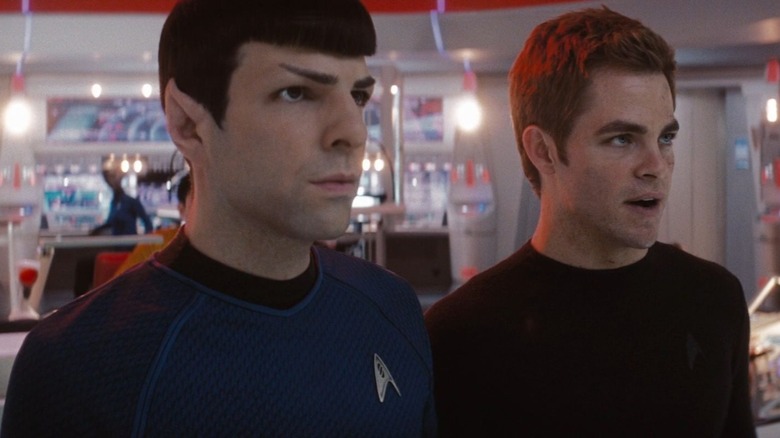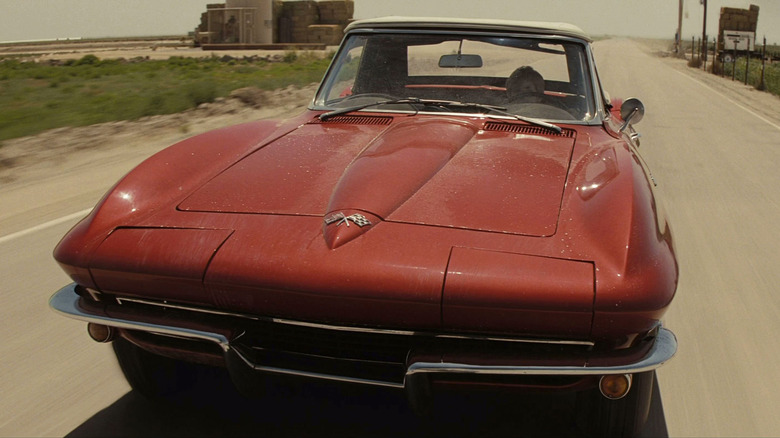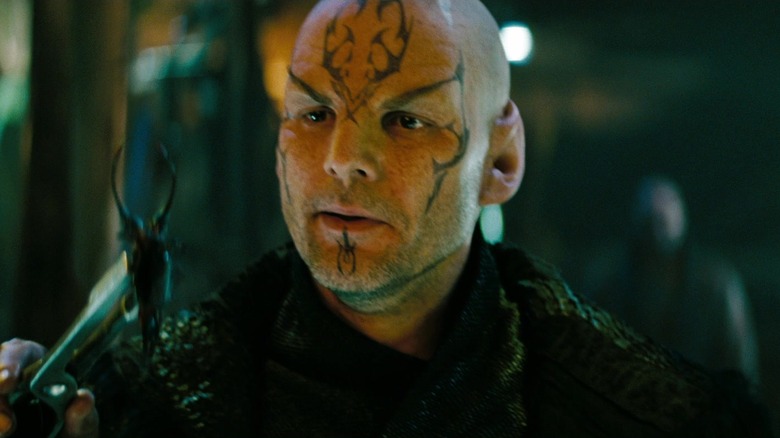J.J. Abrams' Star Trek Had A 'Code Word' That Guided The Entire Vibe Of The Film
It was galling — outrageous, even! — for Trekkies to learn that J.J. Abrams was not one of them.
Abrams, coming off successful TV shows like "Lost" and his first feature film "Mission: Impossible III," was the director selected by Paramount to helm the brand-new reboot of "Star Trek." At the time, the franchise had fizzled out (the final remaining TV series, "Star Trek: Enterprise," had been canceled four years before), and it was crying out for something exciting to get the audience's attention again. Trekkies at the time would have loved something insular and nerdy, like, say, a three-hour epic based on "Star Trek: Deep Space Nine." For legal reasons, Paramount had other ideas.
You see, Paramount and CBS, both previously owned by Viacom, had recently undergone a split, forcing the "Star Trek" movie rights into one camp and "Star Trek" TV rights into the other. Any "Trek" movies put into production would have to be legally different from any of the TV shows. Paramount's solution was to reboot the franchise in an alternate timeline where the characters and ships have the same names but look and behave notably differently. The Kelvinverse was officially born.
Abrams, not a Trekkie, gave himself an aesthetic mandate when making his version of "Star Trek," and it was made to ensure that his "Trek" was to be unlike any of the previous iterations. In the oral history book "The Fifty-Year Mission: The Next 25 Years: From The Next Generation to J. J. Abrams," edited by Mark A. Altman and Edward Gross, Abrams and his screenwriters Roberto Orci and Alex Kurtzman revealed that they had a simple, brazen code phrase when it came to making their new movie its own "thing."
That code phrase was "rock 'n' roll."
Rock 'n' roll
Kurtzman noted that, in 2009, we were much closer to the future timeline of "Star Trek" than show creator Gene Roddenberry was back in the mid-1960s. In the real world, our technology has grown to match what was presented as futuristic and fantastical in 1966; flip-open Starfleet communicators are now less advanced than one's average smartphone. As such, Kurtzman and Orci required something striking — and not necessarily futuristic — to "grab" people and let them know that this wasn't their grandfather's "Star Trek."
Their solution was a sequence of the young James T. Kirk (Jimmy Bennett) driving a 20th-century car and listening to 20th-century music. Kurtzman explained:
"The reason we built the sequence with young Kirk in the Corvette in the trailer is because we wanted the audience to immediately understand that the touch points feel a lot more present than they did when Trek first came out. [...] It's not an accident that that was the first thing you saw in the trailer because there's no way your mind says, 'It's going to be "Star Trek."' When he says his name is James Tiberius Kirk, you go, 'What?' That was all part of bringing people into it from a new place."
This was a wonderful way for the new filmmakers to shake themselves free of what they didn't like about "Star Trek," namely its stodgy intellectualism. That led to Orci revealing their catchphrase. This new "Star Trek" wasn't a classical piece. Orci said:
"Science fiction can be very cold and very abstract, so the idea was to make it still be science fiction, but have it be visceral. Our code word for that was 'rock 'n' roll.'"
One cannot argue that the 2009 "Star Trek" isn't "rock 'n' roll."
Abrams likes action, not Star Trek
Abrams himself abided by the rock 'n' roll mandate as well, wanting to yank "Trek" away from its signature themes of diplomacy and thrust it firmly into the realm of action and adventure. "Trek" can handle action, of course, but in this author's view, it's better when it sticks with philosophy and difficult moral conundrums. Regardless, Abrams wanted something striking and visceral, aiming to make "Trek" more like "Star Wars." Abrams said:
"[F]or me, it was giving people a way into this world in a way it's never been done. By doing this film with the kind of resources that certainly a Trek film has never been allowed to have before. By delivering on a level of visceral fast-paced action that Trek has never really had as its signature. What we came up with was a story of incredible characters, of incredible potential, of real optimism and wonder, and treated it in a way that provides a kind of emotional connection, visceral excitement, visual spectacle that Trek had never seen before."
Abrams would admit in a 2013 interview with Jon Stewart on "The Daily Show" that he never "got" "Star Trek," feeling the characters were too cold and distant. He watched it with friends, and it wasn't his bag. "Trek" was "too philosophical" for him. He always preferred "Star Wars," with explosions, guns, and archetypal heroes and villains.
Stewart, meanwhile, reacted in the natural fashion that any Trekkie might. "I stopped listening to you when you said you didn't like 'Star Trek,'" Stewart said. "I know what happened because your mouth was moving after that, so I'm assuming you apologized."


